Overcoming the Era of Stigmatization and Discrimination
Review – Eve Event of Memorial Ceremony for Jeju 4·3 Victims
Overcoming the Era of Stigmatization and Discrimination
Kim Jin-cheol
Writer and Board Member of Writers Association of Jeju
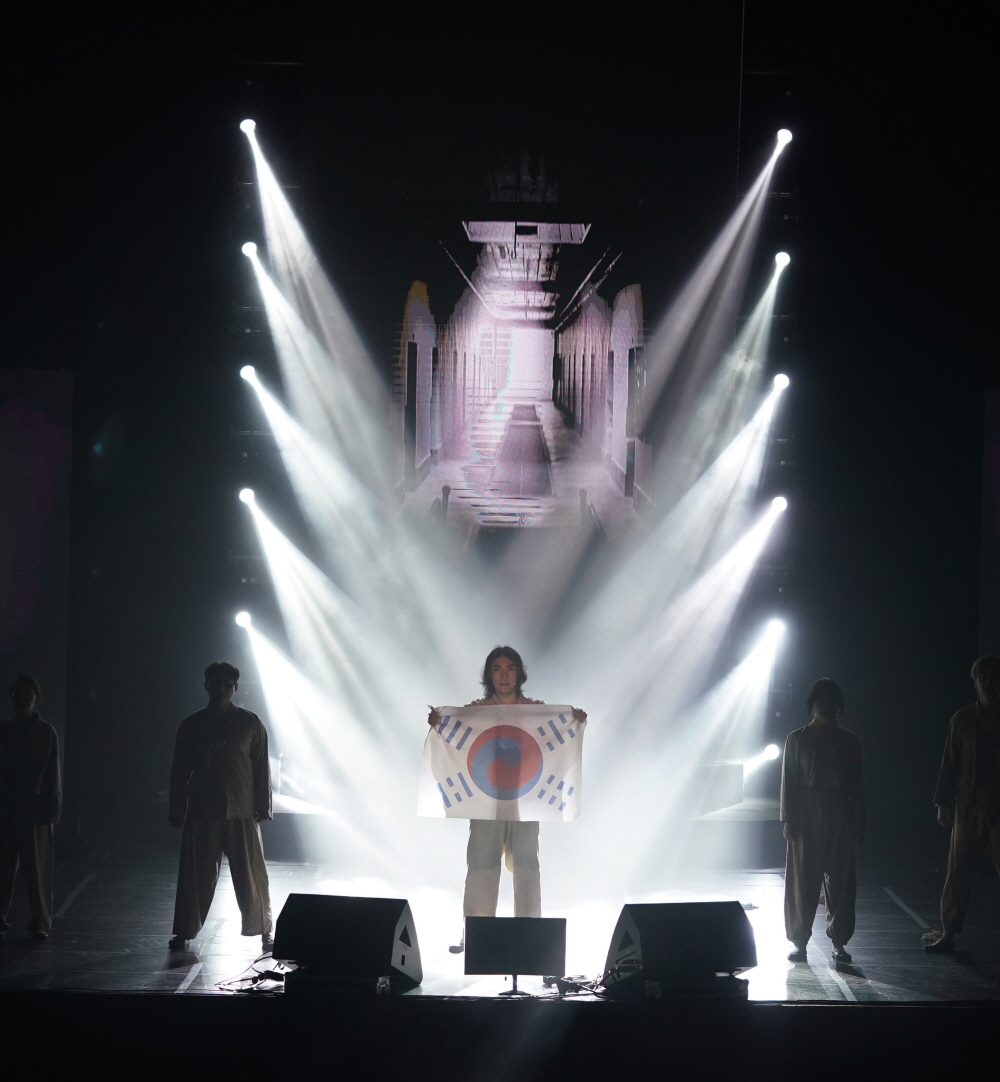
[Musical team “Tunes” stages a performance hoping for national liberation and disapproving of tragic national division.]
The eve event of the 74th Memorial Ceremony for the Victims of Jeju 4·3, hosted by the Jeju 4·3 Peace Foundation and planned by the Jeju Federation of People’s Art Association, was held under the theme of “Overcoming the Stigmatization and Discrimination.”
Last year, the pre-event of the memorial ceremony focused on “unremembered names,” while the program this year addressed the issue of “stigmatization and discrimination” that the people of Jeju had to endure due to Jeju 4·3. The tragic event that swept over Jeju left the island with an unwanted stigma. The stigma of being a “red island,” attached to the region after the March 10 General Strike of 1947, took away the lives and livelihoods of innumerable Jeju residents. Because of that stigma, many of them were convicted under false charges in trials by unlawful courts-martial, and many later went missing. The stigma did not disappear for decades and plagued the people of Jeju. They were unable to escape the yoke of the guilt-by-association system under the charge that their family members were associated with the armed resistance forces. Some even got involved in fabricated cases where they were falsely accused of being spies and had to serve jail terms. For decades, how on earth could the people of Jeju bear the burden of the stigma? Taking this into consideration, attempts were made to unravel their unspoken memories with art during the eve event this year.
The gala concert featured a musical under the theme of the eve event, where the story of an elderly man’s life was told on the stage. The man represents so many others who walked the tragic path of fate regardless of their own will due to the stigma of Jeju 4·3. His father was killed under the false charge of being a rioter during Jeju 4·3. For this reason, he has been pointed out by people as the child of a rioter since he was little. One of the most severe aspects of damage caused by Jeju 4·3 was the merciless destruction of the family-based community. If any of one’s family members died after being accused of being a rioter, he or she was left with the lasting stigma of being “red” (a commie). Then, the person would have no choice but to blame the family member whose sentencing twisted his or her life. However, the memories of victims’ families are full of sorrow for their loved ones. In the musical, the elderly man misses his father whose face he doesn’t even remember. The feelings he has would not be different from what other bereaved families have felt.
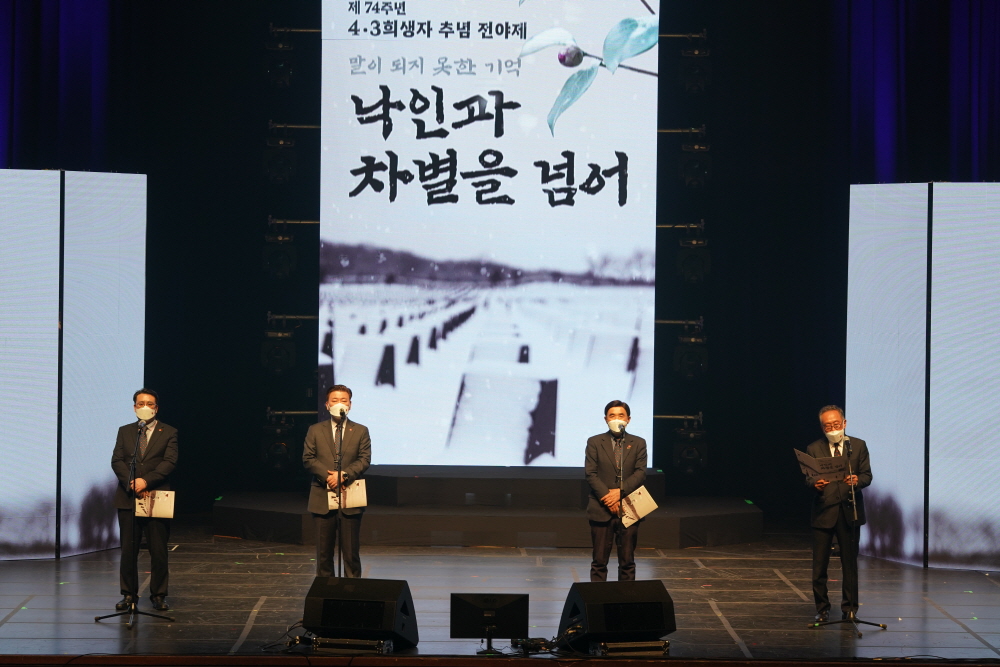
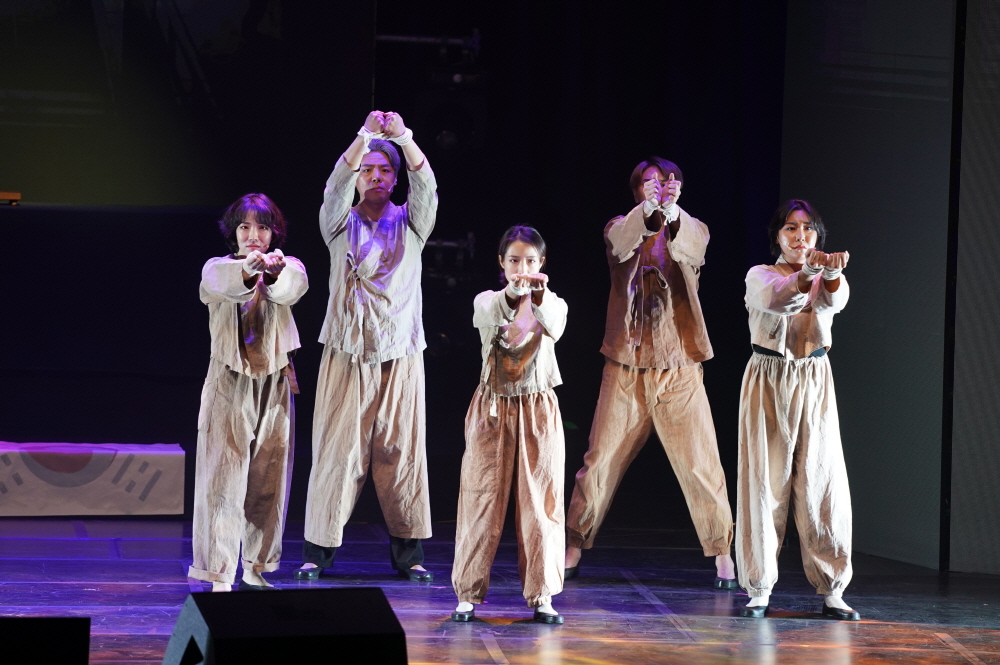
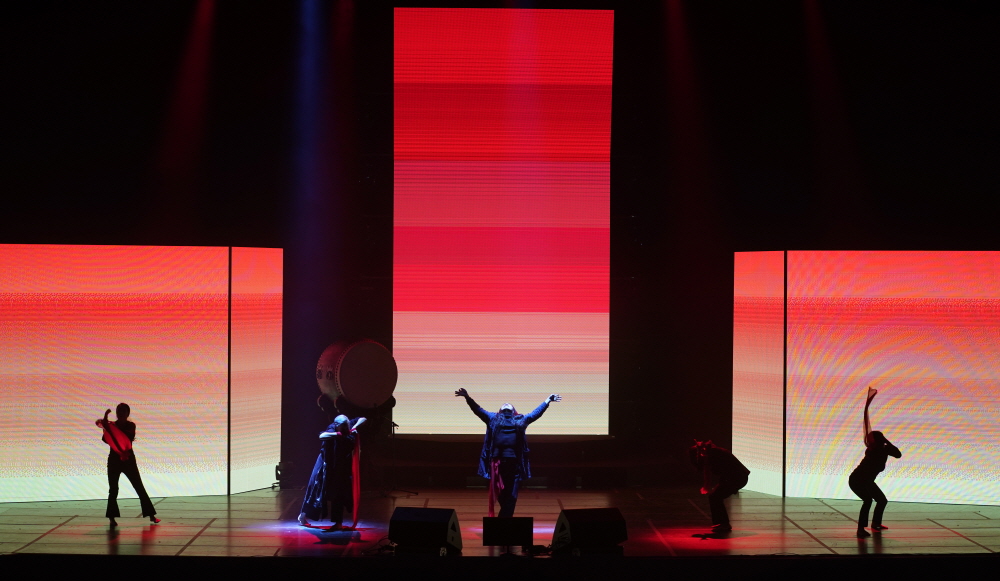
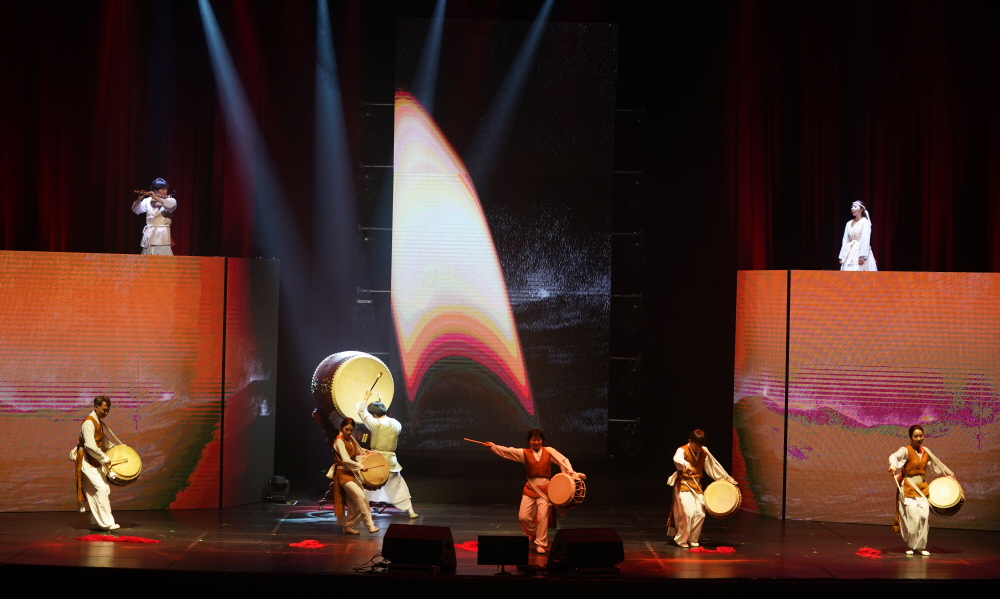
[President Kim Dong-hyeon of Jeju Federation of People’s Art Association, Acting Governor Koo Man-seob of Jeju Special Self-Governing Province, Chairperson Oh Im-jong of the Association of the Bereaved Families of Jeju 4·3 Victims, and President Koh Hee-bum of the Jeju 4·3 Peace Foundation give a memorial speech (Upper left). A play of gestures and sounds, titled “Memories That Are Left Unspoken”, is performed on the stage.]
After an accidental encounter with a relative, the man is imprisoned under a false accusation of working as a spy who sought to overthrow the state, and another bridle of stigma is put on him. It is said that the nation’s fabricated espionage cases involve significantly more residents of Jeju than those of other regions. The reason traces back to the islanders’ experience of Jeju 4·3. Given the nation’s divided situation, those bearing the stigma of espionage have been completely excluded from society. The innocent people who were unexpectedly branded as spies had to endure lives where they could not even dream of anything.
In the story, the elderly man’s father and other prisoners who were falsely accused and convicted due to Jeju 4·3 are finally acquitted in the retrial held several decades after the unlawful courts-martial ruling. Although the cases of social stigmatization decreased as the truth of Jeju 4·3 was investigated and the stories of deaths due to false charges were known to the public, the record of conviction still shackles the lives of victims. Unfortunately, most of the victims have passed away without resolving their sorrow. The good news is that some of them have finally escaped the legal stigma as they were acquitted in the retrial of the courts-martial trials that had lacked due process. Due to this, they can now shout out with dignity, “I am not guilty,” which they have said only to themselves for decades. Monologues told by the elderly man in the story deliver the “unspoken memories” he carried deep in his heart. These memories had been forcibly sealed by state power over the past years. The man had nowhere to turn to when wanting to speak of his family, the horrific experience of Jeju 4·3, and the unfairness of the guilt-by-association system. Since he was not allowed to bring up the topic for several decades, the memories must have remained a lump in his mind. We can only vaguely guess the feelings of victims’ families that has hardened like calluses when they say, “Back then, everyone lived a hard life, and what should we talk about now after so many years have passed?” They had to remain silent for a long time because of state power, but inside, there must be countless cries that have yet to be expressed. These “unspoken memories” were expressed with dancers’ performances. The dancers’ gestures, which took place in silence for two minutes without any background music, are an attempt to reveal the inner cries of the Jeju people that were not expressed outwardly. Each and every gesture of the dancers conveyed through the body allowed the audience to feel the weight of Jeju people’s lives reflected in their silence. “The silence of 74 years was a deeper cry than a two-minute silence. It was a silent scream,” was explained in the introduction of the performance. How many cries of grief and how many screams of pain did they have to hold in their hearts? In the ensuing performance of singing Arirang, I wanted the audience to feel catharsis when the victims’ pent-up sorrows that were not spoken of burst into the singing of Arirang. The lyrics, “Let’s sing confidently of the stories hidden in Halla Mountain” and “I go over the pass of Jeju 4·3”, mean that beyond the years of silence, we should change the “unspoken memories” to “the speakable memories”.
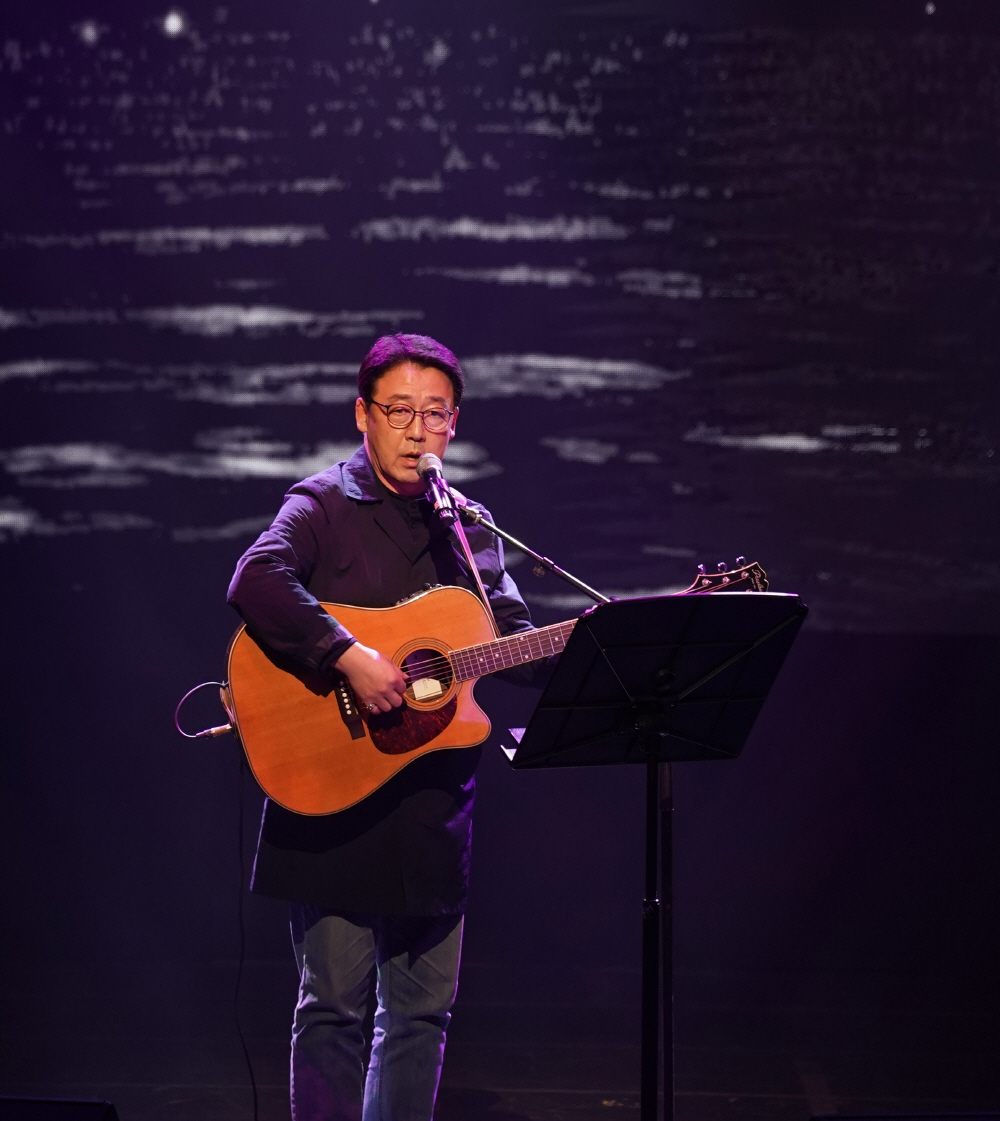
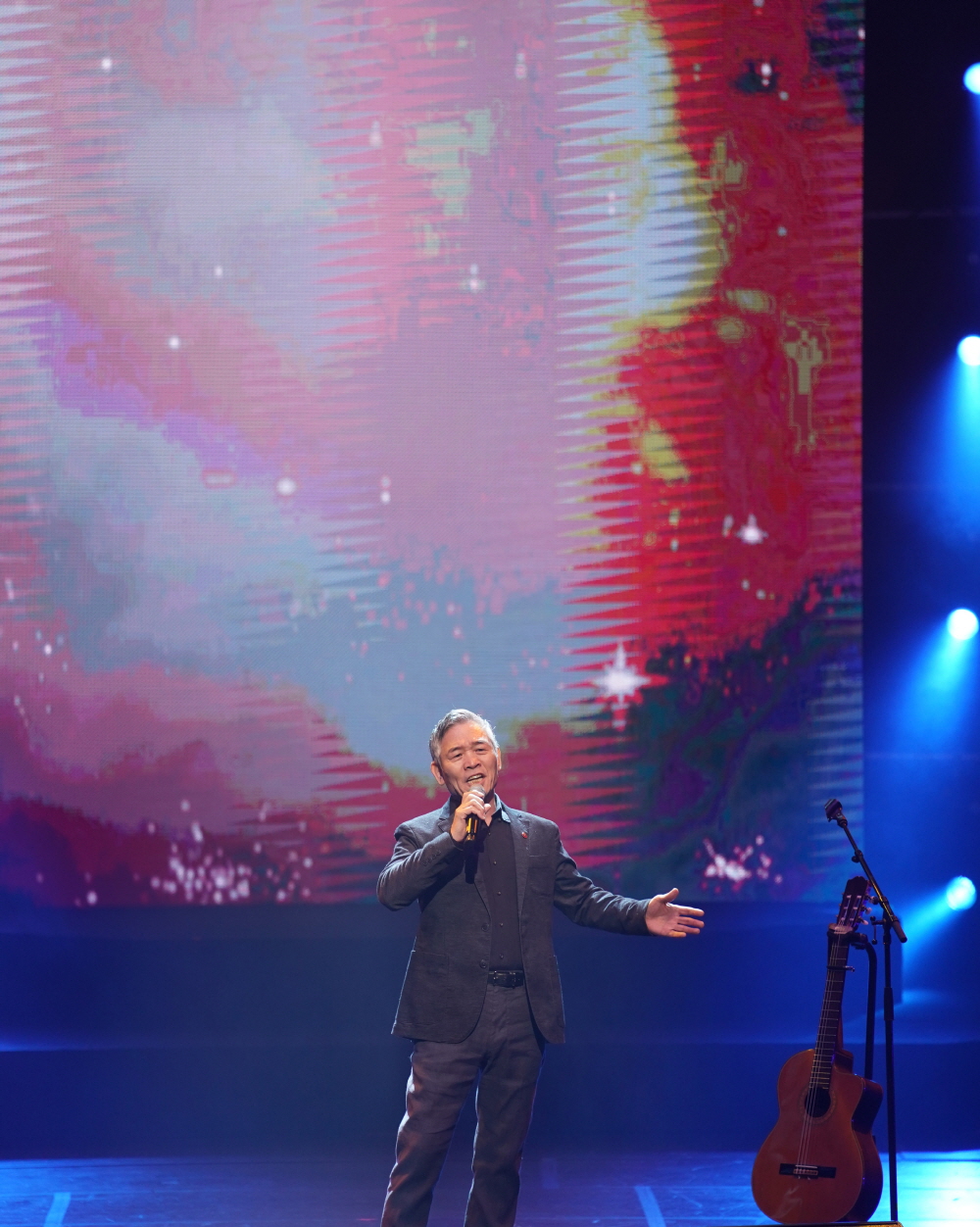
[The eve event featured performances by Kim Dae-ik, a Jeju-born folk singer (left), and Jeong Tae-choon, a singer also known as a “troubadour” of the time.]
Aside from the musical, many musicians of different generations performed on the stage. The Jeju 4·3 Peace Choir, consisting of a children’s choir and Jeju 4·3 victims’ relatives, sang songs conveying the values reflected in Jeju 4·3, while pop singers such as Kim Tae-ik, Jang Sa-ik, and Ahn Ye-eun expressed a memorial tribute by singing their own songs. The song that the entire group of artists sang together at the finale was “Evergreen”. What would be the unchanging values of Jeju 4·3 that we should inherit, just like the unchanging evergreen trees? Previously, President Moon Ja-in said in his memorial speech that Jeju 4·3 will “serve as a compass for human rights, life, peace, and unity for those coming generations heading for a better world”. It is our responsibility to hand down to the next generation the values of Jeju 4·3 that do not end only as memories of what happened in the past but help to stop similar tragedies from happening in the future. In that sense, we can take a step together toward a better future by honoring the victims every year.
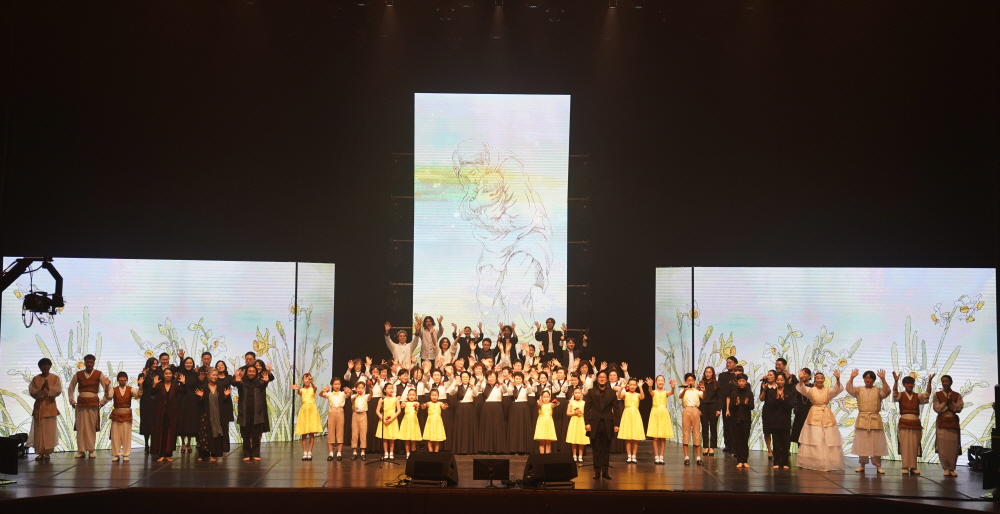
[A choral piece by Evergreen is performed.]
Furthermore, reviving the unspoken memories that have been stuck in ideology is another task of ours in properly valuing Jeju 4·3, just as President Kim Dong-hyeon of the Jeju Federation of People’s Art Association said, “Just as the painful day is remembered, the enthusiastic shout every April should also be spoken of as a part of the truthful history.”
“Do-ol” Kim Yong-ok said Jeju 4·3 values “self-reliance” and “independence”. We need to approach the substantive truth about what kind of society Koreans dreamed of after national liberation and for what innumerable people were sacrificed. Only then will “Baekbi,” that lies without a title, be able to be inscribed with the true name of Jeju 4·3.
Political circles always refer to the complete resolution of Jeju 4·3. I wonder what they mean by speaking of the complete resolution. Questions remain over whether they believe financial compensation will be enough to completely resolve what the people of Jeju experienced for several decades. There are still a lot of tasks to be carried out. So many people remain shackled with stigma, while it is difficult to find traces of the missing victims. We should also make more concerted efforts to excavate the remains of those that are buried somewhere. On top of that, the issue of who should be held responsible for Jeju 4·3 has not been properly addressed. A monument to the person who ordered the killing of Jeju people is erected on Jeju’s soil, while there remain memories that are sealed just like the entrance of Darangshigul Cave. Without solving these issues, the complete resolution of Jeju 4·3 will be nothing more than an empty slogan. It is my understanding that everyone shares a common desire concerning Jeju 4·3. I believe that there will be a day when we can get rid of the outdated shackles of stigmatization and discrimination and restore the unspoken memories. With the COVID-19 situation getting a little better, the eve event of this year was attended by many people. I hope that it was a time for some people to comfort their pain from the past events, and a time for others to dream of a hopeful future.